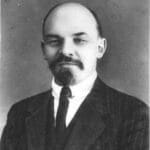About the text:
From On Imperialism and Opportunism, Futura 1974, 103 p., pp. 85-87.
(Extract)
Written April 15, 1919,
published in May 1919.
(…)
If any Marxist, or any person, indeed, who has a general knowledge of modern science, were asked whether it is likely that the transition of the different capitalist countries to the dictatorship of the proletariat will take place in an identical or harmoniously proportionate way, his answer would undoubtedly be in the negative. There never has been and never could be even, harmonious, or proportionate development in the capitalist world. Each country has developed more strongly first one, then another aspect or feature or group of features of capitalism and of the working-class movement. The process of development has been uneven.
When France was carrying out her great bourgeois revolution and rousing the whole European continent to a historically new life, Britain proved to be at the head of the counter-revolutionary coalition, although at the same time she was much more developed capitalistically than France. The British working-class movement of that period, however, brilliantly anticipated much that was contained in the future Marxism.
When Britain gave the world Chartism, the first broad, truly mass and politically organised proletarian revolutionary movement, bourgeois revolutions, most of them weak, were taking place on the European continent, and the first great civil war between the proletariat and the bourgeoisie had broken out in France. The bourgeoisie defeated the various national contingents of the proletariat one by one, in different ways in different countries.
Britain was the model of a country in which, as Engels put it, the bourgeoisie had produced, alongside a bourgeois aristocracy, a very bourgeois upper stratum of the proletariat. [44] For several decades this advanced capitalist country lagged behind in the revolutionary struggle of the proletariat. France seemed to have exhausted the strength of the proletariat in two heroic working-class revolts of 1848 and 1871 against the bourgeoisie that made very considerable contributions to world-historical development. Leadership in the International of the working-class movement then passed to Germany; that was in the seventies of the nineteenth century, when she lagged economically behind Britain and France. But when Germany had outstripped these two countries economically, i.e., by the second decade of the twentieth century, the Marxist workers’ party of Germany, that model for the whole world, found itself headed by a handful of utter scoundrels, the most filthy blackguards – from Scheidemann and Noske to David and Legien – loathsome hangmen drawn from the workers’ ranks who had sold themselves to the capitalists, who were in the service of the monarchy and the counter-revolutionary bourgeoisie.
World history is leading unswervingly towards the dictatorship of the proletariat, but is doing so by paths that are anything but smooth, simple and straight.
When Karl Kautsky was still a Marxist and not the renegade from Marxism he became when he began to champion unity with the Scheidemanns and to support bourgeois democracy against Soviet, or proletarian, democracy, he wrote an article – this was at the turn of the century – entitled “The Slays and Revolution”. In this article he traced the historical conditions that pointed to the possibility of leadership in the world revolutionary movement passing to the Slays.
And so it has. Leadership in the revolutionary proletarian International has passed for a time – for a short time, it goes without saying – to the Russians, just as at various periods of the nineteenth century it was in the hands of the British, then of the French, then of the Germans.
I have had occasion more than once to say that it was easier for the Russians than for the advanced countries to begin the great proletarian revolution, but that it will be more difficult for them to continue it and carry it to final victory, in the sense of the complete organisation of a socialist society.
(…)
LCW Vol. 29, p. 308-310.
[44] “Marx and Engels: On Colonies, Industrial Monopoly and Working Class Movement”, Futura, 1972, p. 27.
The full text can be found online at Marxist Internet Archive.


























